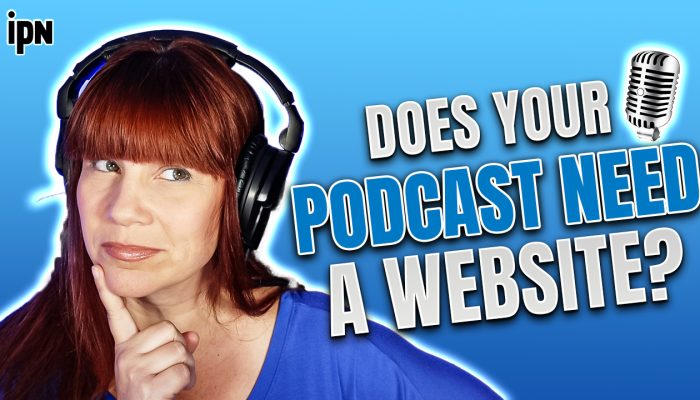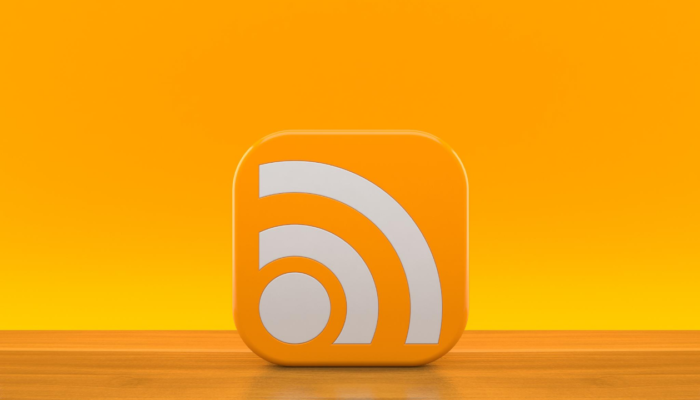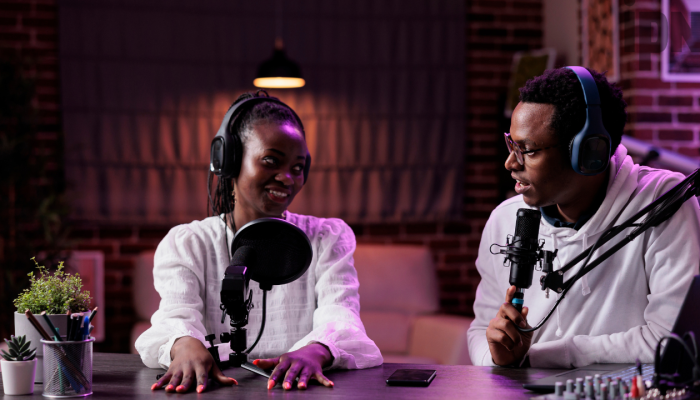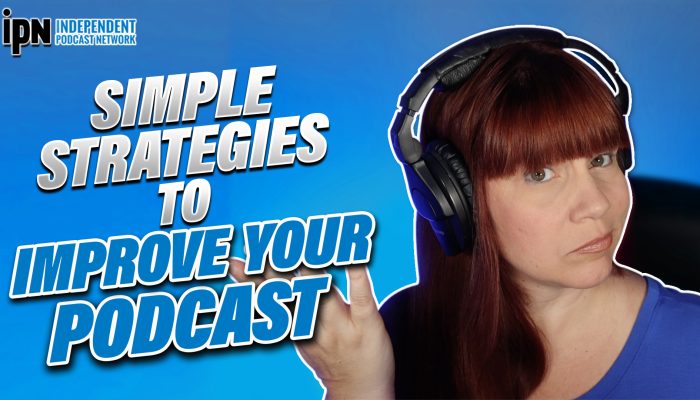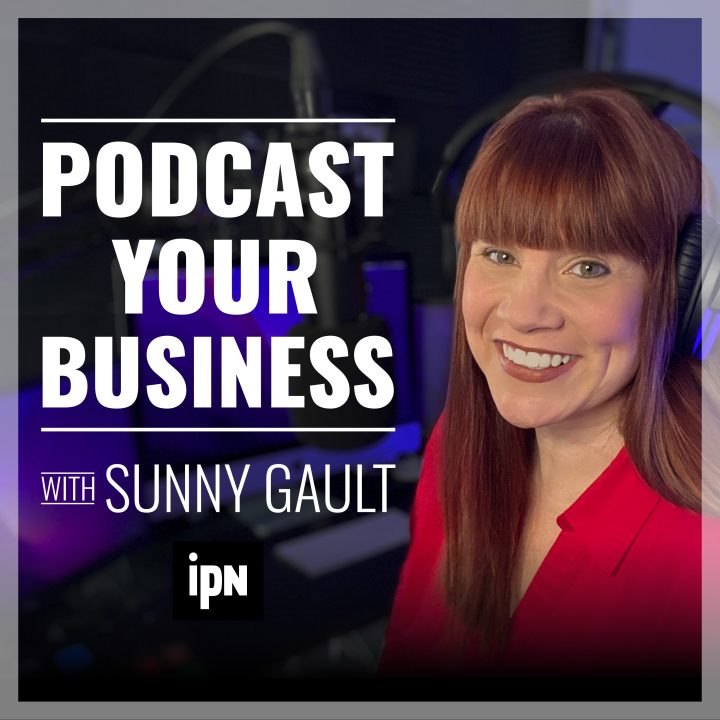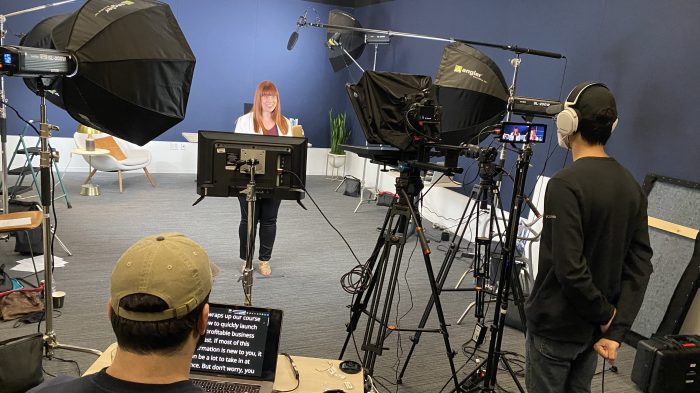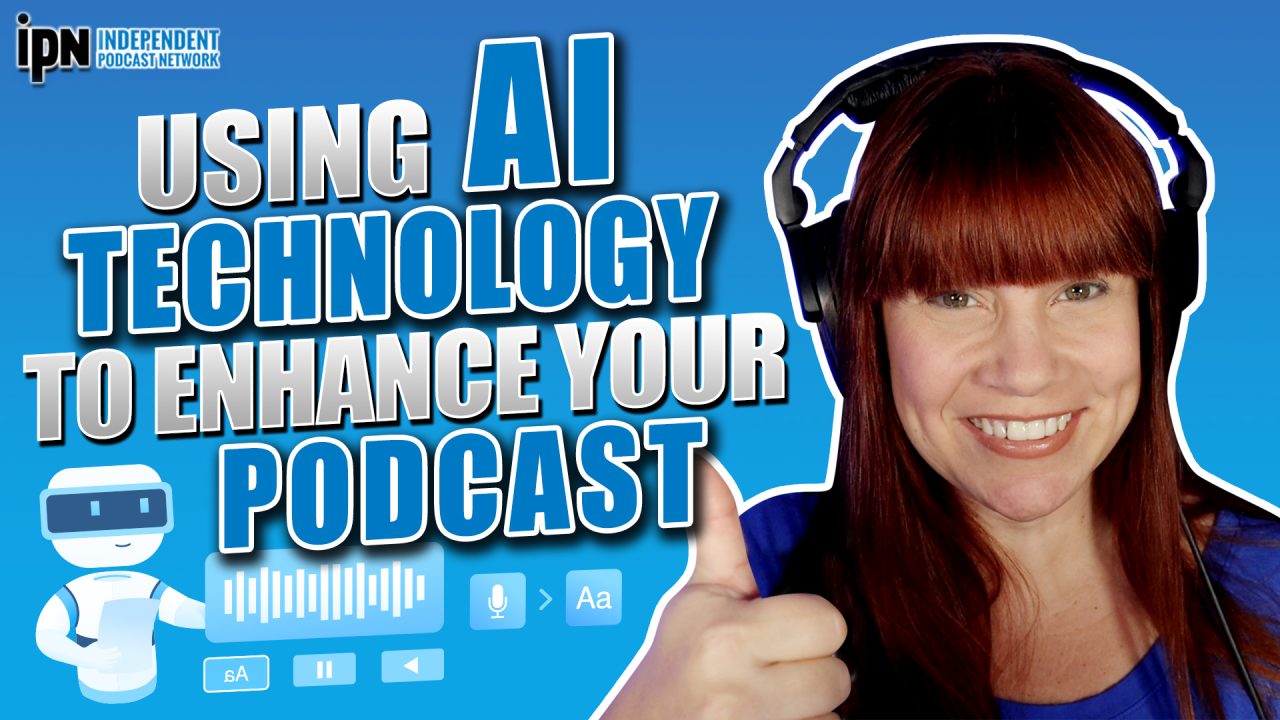
how artificial Intelligence can simplify planning, production, and promotion
The term “artificial intelligence” may seem a little sci-fi, but AI is probably powering many of the tools you use on a daily basis. It can also help you create your podcast episodes- whether you need ideas for topics, you’re editing your episodes, or you’re promoting them to your audience. How much AI you use is completely up to you. Today we’re discussing the pros and cons as well as some programs you can check out.
Here’s what we’re going to discuss…
- Should you use AI tools to help with your podcast?
- Review the different types of AI tools for podcasting
- Reveal our list of AI programs to help podcasters
Here are the AI programs we discuss in this episode…
https://jasper.ai
https://bard.google.com
https://play.ht
https://descript.com
https://castmagic.io
https://swellai.com
what type of ads are best for your podcast?
Discover the difference between the two different types of ads you can insert in your podcast episodes.

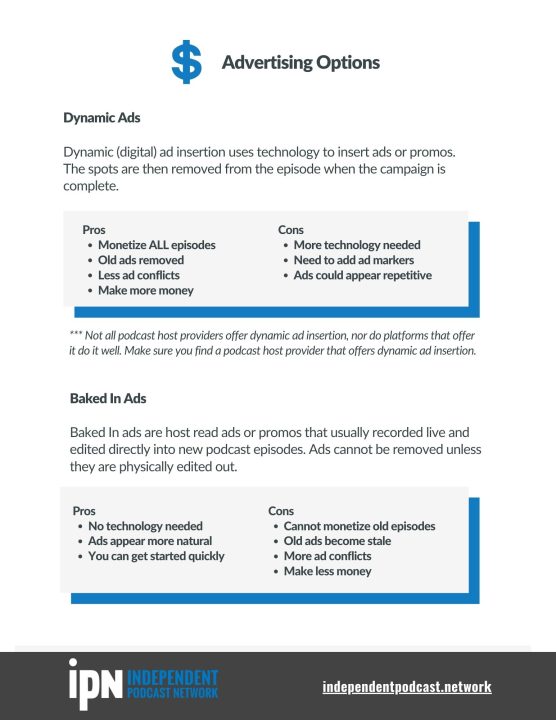
Episode Transcript
0:02
The term artificial intelligence may seem a little sci-fi, but AI is probably powering many of the tools you use on a regular basis. And they can also help you create your podcast episodes. Whether you need ideas for topics, you’re editing your episodes, or you’re promoting them to your audience, how much AI you use is completely up to you. So today we’re discussing the pros and cons, as well as some programs you may want to check out. Take it away, Mr. radio man. Podcast Your Business.
0:43
Hey, everybody, welcome back to another glorious episode of podcast your business. I’m Sunny Gault. I’m a podcast coach and mentor. And I’ve been doing this whole podcasting thing for about 17 years now. I am the founder and CEO of a company called Independent Podcast Network. And you can find us at https://independentpodcast.network, it’s great for SEO, it’s a really long thing to type into your browser. Today, I am here to help you create amazing podcasts for your business. This is what I do with the podcasts that I work with at Independent Podcast Network. So we help all types of podcasts. If you’re brand new to podcasting, we basically just provide a ton of free content for you, including this podcast, to help you get your show up and running. And then when you’re ready to monetize your show, that’s when we work a little bit more closely with podcasts. And I would love to tell you more about that. So if you’re interested in any of that, check out our website. But today, we’ve got some more amazing podcasting tips for you. And we break this down into something we call the five P’s of podcasting. So what are the five Ps, this is something that I created a while back, I would say three or four years ago, when I was creating my first podcasting course. And I really thought about what do podcasters need to know, in order to have a successful show, I totally did not mean to rhyme. And it just kind of happened. And what I came up with, were five P’s. And these are the different steps that you go through. Now there’s a lot of stuff that you need to know or that you should know as you go through these five steps. But we’re talking about prepping for your podcast, you know, should you even start a podcast? What are the resources that you think you might have available to you in order to podcast some of those early questions? And then we have plan, which is all about the look and feel for your show? What is your show going to look like? What is the overall format for your show, produce is about creating content, promote is telling everybody about your content, because you could have the most fabulous podcast in the world. But if nobody knows about it, then it’s kind of like it doesn’t exist, right? And then the fifth P is profit. How do we make money because if you are podcasting for your business, then somehow it needs to benefit your business. Most times, that means monetarily. So those are the five P’s. Mr. radio man, which of the five P’s are we talking about today? Produce.
3:09
Yeah, this was a tough one today, it’s this falls into the produce, promote maybe even a little bit of plan, but I went with produce, which P really depends on which AI tool you’re talking about. And like I said in the intro, we’re using these tools all the time. It’s just you know, sometimes it’s not called AI. It’s built into whatever system or platform we’re using. But now this whole terminology around AI is coming to the forefront. And we have to decide is this something that we want to knowingly use and how much of it do we want to use in our show, because you can use AI to create content for your podcast episode, you can use it to help edit your show and enhance it. And also to write the content needed to promote your show to your audience and catch their attention. So you can grow your overall audience for your show. So today, we are going to we’re going to dive into all of this. But the three main things we’re going to talk about today First, should you use AI to help with your podcast, and I’m gonna go through some of the pros. And some of the cons. I do have personal experience using different AI programs. And so I’m just going to share some of that with you and get you thinking about well, is this right for me or not? Like I said, you’re not going to avoid it overall. It’s just a matter of how much are you going to use when you do your show? Then we’re going to talk and review some of the different types of AI tools for podcasting. So if you decide, yeah, this is something I really want to do. This is a list of things it can help you with. So you know, everything from coming up with topics for your episodes. And then you know, we’ll talk a little bit about production and the different production tools and you know, it’s starting to be used in promotion and things like that. So we’ll go over how AI can help you Podcast. And then finally, I am going to share some AI programs that are available now as of the recording of this episode to help podcasters. And I’m sure a lot more are going to be created, some are gonna go, you know, by the wayside, new programs are going to be invented, but I’ll leave share with you my experience of the things that I’ve used so far my overall, you know, thought process and you know, how they worked and things like that to help you narrow down the field, there are programs that are specific for podcasting. You know, you can just use regular AI, you’ve heard of Chat GPT, and all of that. But there are a couple of programs that I want to share with you that are specific to podcasters. Okay, so I think this is going to be a fun show, we’ll get started with all this right after this quick break.
5:49
So should you use AI tools to help you with your podcast, at least the tools that are promoting themselves as AI tools, because like I said, you’re using it, we’re using it every day when we wake up in the morning, and we go to work and you know, we get money out of the bank. And whatever you do, you are using AI technology, you cannot get around this. But promotion of it is changing. And there are tools that are coming out now that are specifically saying, Hey, we’re AI, and we’re going to help you do this or do that. So, you know, what are some of the pros and cons here. Some of the pros that I have found is that if you find the right program, it can save you time, what do I mean by that? Well, it takes time to come up with ideas for your show, it takes time to edit, it takes time to promote. So if you can have a tool that comes up with all these different ideas for you, that’s nice, that may save you time, because maybe you’re the person putting all that together, it may save whoever you’ve hired to do this, maybe you have you know, an assistant or someone, a host or whatever, a producer that’s helping you write this kind of content and you know, do all these different things. So it could save them time, it could save money depending on how often you use it. Because some AI programs out there are pretty expensive. So if you can justify the cost, because either you’re producing enough content, or maybe you’re doing multiple podcasts, you know, not just a single podcast, then that’s great, can save you money, you definitely, you know, if you’re going to use an AI system, especially if you’re using it for promotion, as opposed to the production of it, which we’ll get to in a second, then I don’t recommend hiring a bunch of people to do the same thing that the AI could do, you almost kind of have to pick unless your budget is unlimited. And if that’s the case, call me Hey. So yeah, you’re gonna have to pick one camp or another, most podcasters don’t have a huge budget, most podcasters are doing things pretty much as a what we call a one man band, so you’re kind of doing everything for your show. But maybe you’ve got a little bit more wiggle room. And you know, you can hire people and have an AI system to, to manage it all. And you know, to really get your word out there in a ton of different ways. That’s fantastic if you can, in general AI tools should allow you to do more with less. And if that’s the case, a lot of times that will lead to less stress, you know, feeling more productive, because things are getting done. So those are some of the pros.
8:34
When we look at the cons, we are using an artificial intelligence, and technology is getting better and better. With artificial intelligence, the whole idea behind it is that it’s supposed to learn and grow. So it’s not supposed to stay at the same level. That’s why that’s the intelligence side of it. Right? It should learn. So if it’s making some, let’s just call them mistakes in the beginning, it should learn from that, and down the road make less and less mistakes. But I will tell you that not all programs work well. So just because something says AI doesn’t mean you know, it’s as good as another program. So there’s a little bit of digging that most people have to do. And I will say to that sometimes there can be a learning curve, to using these programs. Because it’s usually based on the commands that you’re giving the AI system. And if you don’t give the command properly. You’re not going to get what you want out of it. And sometimes it takes time to tweak to make sure you get the commands, right. There are programs which we’ll talk about in a bit that have pre built commands in them. And that’s definitely helpful. But you’re probably going to have to give the system additional commands depending on what you’re trying to do, and that just takes a little bit of time there is a learning curve there, I have been using a program, I’ll just say the name of it, I’ll mention it later, too, but called Jasper jasper.ai. I’ve been using this for another project that I’m working on to rewrite content. So you’ve got a, you know, a bunch of content and you want it rewritten, you know, make it fresh or whatever. I’ve been using an AI system to do that. And I will say, the commands that we give it are extremely important. And we have taken time to finesse these commands a million different times. And then it’s interesting, because then the platform will make an adjustment, and then the command that we use doesn’t work as well anymore. So then we got adjusted again, it’s kind of like finding the exact formula, right? Like, if you’re almost like a scientist with a bunch of bottles, and you know, I don’t know, motions, and you’re trying to figure out, well, how do I get this, you know, perfect command, that’s going to give me the content that I need. So that’s what I’m talking about when I say there can be a learning curve to this, not just learning the program, but these commands that you give the system. And also, the information could be inaccurate, I have, I’ve given AI systems, a batch of content, like in text form. And I’ve said rewrite this, and it will come up with a quote from someone that they never said, that was not part of the content that I originally gave them. So I don’t really know where they’re pulling this content from. But to say that, listen, you know, AI is going to do everything for you don’t even have to think anymore is ridiculous. Okay? This is a tool, it should never replace what makes your podcast you, if there is ever a tool that comes out and says, Hey, I’ve always wanted to do a podcast now you can click this button, and it’ll create a whole podcast for you walk away, in fact, run, run, that is not how we’re supposed to be using these tools. Again, it is a tool to help you with your podcast, it should not just be creating content. And you know, if there are limitations, okay, I don’t think we realize how often in life, we miss that connectivity with real people, real human beings. So we have to be careful with this. If everyone just started using AI to create blog posts from their podcast episodes, well, there’s something that’s lost. I mean, the nice thing about reading a blog post or whatever now is that you, at least with the ones I read, I know that there’s a real person behind it, and they’re gonna put their personal stories behind, and they’re gonna, they’re gonna make it more relatable. But if we’re all just regurgitating the same content through some sort of AI device, what kind of fun is that? So just be careful. I know, we’re trying to be more productive. But, you know, we also need to make sure the information is accurate, and not just put out content for the sake of putting out content. You know, let’s be smart. Let’s work smarter, not harder, right? You guys have heard that term before. Because a lot of this stuff you’re gonna create no matter what, but if this is like, Oh, I’m gonna be in a million places all at the same time. And we’re all just regurgitating content, I don’t get that. Okay, so And let’s hope they never come up with a program, it’s like push this button, then we’ll do a whole podcast episode for you with a fake voice. Let’s hope that never happens. Because then we’re on the wrong track.
13:32
Alright, so let’s talk now about the different types of AI tools for podcasting. In other words, how can this help you in producing or promoting your show or your into, you know, your entire podcast for that matter. So there are some different things, we have automatic transcriptions, this has been around for a long time, right? I have promoted them on this podcast before there’s different different programs out there, that you upload a file, it’ll come up with a transcription for you automatically. By the way, this is the base of how pretty much all of these AI systems work it usually, if the content is originally in an audio or video format, then it first needs to get a transcription of it before it can do a lot of the stuff and it’s only as good as the original transcription. So that’s just an important point to make. You have to make sure that the transcription is good. And if it’s not, usually these AI programs have the ability to go in there and tweak the content. So again, this is not completely hands off. This is another tool, you know, in your toolbox to help you with your podcast. But you know, it starts with having a good transcription so can automate transcriptions for you. And then you can use those in different ways right? This can help you with SEO for your podcast, you know, for every podcast episode that I produce, not only for podcast your business, but All of the parenting shows that I do, we have a transcription that’s generated automatically. And we use that we put it on the website. So all of the text is on the website. So people can, you know, find it if they’re searching for different things that can also help you to, if you have people that want to access to your show that are hearing impaired, right, if they can’t audibly hear your podcast, let’s say it’s not a video podcast, but just an audio podcast. So that can help them get the content, it also helps with people who want to just kind of skim the content, maybe they don’t want to actually hear your podcast, they just want you to access the content, they can do it that way. This is also really helpful for repurposing content. And this gets into the more promotion of it and you know, different ways you know how you can use AI tools to promote your podcast. But you know, being able to take your podcast content, convert it into a blog post, or some sort of other content or something, you know, social media post or something like that, you know, it’s still based on information that you created. So I don’t necessarily have a problem with that if you’re creating a blog post from your podcast content that’s different. My issue is with people that use AI and just say, hey, write a blog post on, you know, different ways to hike this mountain or whatever. Well, if everybody’s doing that, aren’t we just regurgitating the same stuff. So don’t do that. Don’t do that. But if you want to find different ways to connect with your audience, and you’ve already created the podcast episode, well, then yeah, convert it into a blog post, do different things with it, repurpose your content. You can also use it to add text to video. So for those of you who are interested in producing more video, and you have the podcast episode, you know, there are different tools, you can use descriptors, one of them, you know, I’ll mention them again later. But they’re very well known for being able to automatically so they basically transcribe the audio portion of your content, and then they will put it on video for you. And then it’s just a matter of going back and tweaking some stuff. So that can be very helpful. All right, you can also use it for speech to text. Alright, so I’m speaking something and it’s turning into text, which is kind of a transcription. But let’s say you want to use it, not necessarily in a transcription format, but maybe for planning episodes, maybe you don’t want to type out all of your notes. Or maybe you’re just doing a data dump from your brain, you know, it’s time to create a new podcast season. And you’re like, Okay, let’s just let me think about all the things I’ve talked about with my clients. For the last, you know, six months, we’re going to do a data dump, we’re going to, you know, just want to be able to talk have it turned into text, so I can plan out future episodes. That’s incredible.
17:53
The other way text to speech is helping us is through editing. So when you are, how do I explain this, not all systems have this, but we’re seeing this more and more. And I believe descript allows you to do this as well. We are used to most of us who are a little bit more old school. When you’re editing content, whether it is audio or video, you’re used to like a timeline, right. And, you know, it’s not a format that unless you’re really used to working with audio and video content that you would be familiar with. But a lot more people are familiar with like a Word document, and how you would edit a Word document. So now programs like descript are allowing you to you know, comes up with the transcription. Like I said, that’s usually the base for everything. And then to edit your podcast episode, you can just go in there and remove words from this document. And it will automatically edit it as if you were editing in a timeline. Okay, so you can use this speech to text in a lot of different ways for editing purposes. Now let’s talk a little bit about the production side of it. We’re kind of getting into that anyways, AI tools are already being used in a lot of different ways to clean up your audio. So let’s say you recorded something and I don’t know if you guys just heard that motorcycle in the background. Like I could really use AI to help me remove that motorcycle. So that’s just one example right? You need to remove something something got noisy when you were editing or when you were recording your podcast, you want to clean up the audio, maybe someone has a fan in the background. We’re not all audio engineers. But you know this is the real world and sometimes we record and you know things happen so the system or I should say you know different companies and stuff out there are creating tools that are you know, kind of built into whatever their platform is allowing you to apply these types of filters but it is still AI technology. I think a lot of you know that Previously I worked for Zencastr. Zencastr is a recording platform that allows you to record with your guests remotely. And it’s through a browser, right? So you join in this link, they join on this link, and then you can record together, you get the files. And there you go. One of the things that we were experimenting with, before I left the company was using artificial intelligence to remove long pauses. So when you’re recording with someone, and either your guest or you, there’s a long pause, you could minimize those pauses. So the system, you know, after you’re done recording, you could go back in and say, Hey, for any pause, that’s longer than three seconds, reduce that to one second, or two seconds, or whatever. So that helps you in the editing process, right? We were also experimenting with the removal of bad words. So let’s say your, your guest, you know, has a potty mouth. And you know, you need to remove those words, because you have a G rated show, or whatever it is, that’s just one example. So you could do that. So all of this is artificial, right. And there is an intelligence behind it, because I would be in these meetings where we would be testing stuff out, and it wasn’t quite hitting the mark like it was mistaking one word for another word. But as people use it more and more than it refines itself. Okay. So those are some examples on how it’s being used for production purposes. Now, let’s talk about how to use it for promotion. And this is where we’re seeing a lot of activity right now in podcasting, with content creation. But again, this still kind of falls into the promotion side of things. When you are done recording your podcast, there are certain things that you are going to have to create. In order for people to find your content, you have to come up with a show title, you need some show notes, or a paragraph description, whatever you do for your show, so people know what the episode is about, you may want timestamps, you may need your guests bio written, you may need posts for social media, you may want bullet points of everything that was discussed in the show or some sort of summarization, maybe you want to pull out quotes or different hooks, important pieces of content. So you can promote that in some sort of graphic or whatever. All of this you can do with AI tools. Now, those kinds of tools are specific for podcasters, you might be able to use general AI tools to manage that. And we’re going to talk about those tools in just a second. But for the most part, I would say, if you really want to use AI for your podcast, and to cover all your bases, specifically for your podcast, then, you know, the different platforms out there that focus on podcasters are going to be your best bet.
22:51
So now let’s talk about the AI programs that can benefit podcasters. The first is what I mentioned earlier, it is the tool that I’m using on that side project I was telling you about called jasper.ai. By the way, I’m going to include all of these links in the episode description. So I’m just going to run through these really quickly. But I encourage you guys to go to the website, check these out. The first 1234 that I talk about are not specific to podcasters. And then there’s two that are specific. So Jasper is not specific. And they promote themselves as being a great AI tool for large teams. I’m not really sure why they do that. But I was noticing in their marketing materials, so that may or may not be a good fit for you, it does a ton of different things. And they do have, you know, a rather large support team to help you if you’re, you know, still kind of struggling with stuff. So that’s most of my experience has been with Jasper AI, I’m still not crazy overall about using AI systems. And that’s simply because I really haven’t mastered any of these programs, because I get frustrated. And I’m like, I’ll just write it myself. And right now that’s okay, with the content that I’m creating for podcast your business, like it’s pretty easy to do. So I don’t necessarily need these systems right now. But Jasper is one of them. And again, they promote themselves to, to to be involved in larger teams. So you’ve got more team, you know, different functionalities for teams, right and tools for teams that are working on projects together. Google also came out with what they call an AI experiment. And it’s called B-A-R-D and you can find it at https://bard.google.com You know, how Google… Google has a tendancy to be at least on the on the face of things, keep things pretty simple, you know, you go to their search engine page there, you know, google.com And it’s like, What are you searching for today? It’s not like a busy page or anything. And they’ve kind of done the same thing with Bard. Now I heard a bar the first time Because I run a mastermind group for people that run podcast networks, and we were talking about AI, and this came up, this is not specific to podcasting, you can pretty much ask Google whatever you want. And see, I mean, it’s obviously pulling from the search engine, right? And see what pops up. I do not have a lot of experience with this. This kind of seems like a parlor trick or something to me, I don’t know. But it is free, it is free. So I don’t know you can check it out. They had an example on their site of hey, Google, I’m going camping, you know, I want to do this, this and this, what should I bring. So it’s all over the map, just you know, you can experiment with it. And you know, see if it could work for you if you want to play around with some AI stuff.
26:36
Next, we have https://play.ht. And this is an AI voice generator and text to speech. So you’ve got the text, and you need someone or something, I guess to voice it. Now, full disclosure. Here, I’m a little bit jaded when it comes to these programs, because I have done different voiceovers. In the past, I’ve worked on many different projects where I’ve used my voice. And I do believe that there’s something special about having an actual person read your content, there is something about the frequency behind someone’s voice that I don’t know, we just connect with as human beings. So to be honest, I am not a fan, at least not yet of these generators that create a fake voice, you know, based on someone’s text, but if that is something that you want to play around with, feel free, there you go. play.ht. In fact, I was working on this project, still kind of working on it. But I was working on this project. And we needed people with different accents to voice the copy. And I thought, Oh, well, I’ll just check out one of these, you know, voice AI voice generators. And I tried you guys I really tried, I had the copy. I was trying to convert it, you know, and have someone that sounded decent, I don’t know, read the copy. And it just sounded so fake to me. Obviously, all programs, you know, work a little bit differently, and some are better than others. But I just couldn’t handle it. I ended up hiring voiceover artists on Fiverr to voice it because I needed a real human. But if you want to play around with that, there you go https://play.ht. We’ve already talked about Descript. Right and how you can edit with described and how you can put titles on your videos and fun things like that. They promote themselves as a simple video and podcast editor. So that is a I believe it’s a subscription plan. I currently have a subscription, but I don’t use it that much. So I think it’s going to run out soon. So you can check that out. I’m sure they have some sort of free option, you know, least to try it out as well. https://castmagic.io and https://swellai.com. Both of these are specifically for podcasters. So after listening to did it to today’s episode, if you are thinking yeah, I think I want to give this a go, I would recommend testing out something that is specific for podcasters before diving into these other ones, because sometimes you just feel like there’s too many options. And at least the ones that are focused on podcasters are going to give you some of those commands that are already built into the program. So they’re gonna give you 10 different options of what your podcast episode title could be, or different quotes of what was said, you know, during the podcast, so you can somehow convert that into perhaps an audio gram are some sort of graphics, so they kind of already know what you’re looking for. There are some differences between the two, the only experience that I have is using CastMagic, but from what I can tell with some of my colleagues, there are a lot of people that prefer SwellAI. I can tell you that SwellAI has some better pricing on their website, they seem to offer more features and integrations and things like that. But I think both would be a good opportunity for you guys to get your feet wet in AI specifically for your podcast. And it is what you make of it right? Don’t think that any of this is just going to happen overnight, it’s going to take a little bit of time to get to know the system, you know, to come up with those commands and things like that. Make sure they have good customer support, whatever platform you use. I know with CastMagic, one of the things I liked about CastMagic is that they do have a community group on Slack where other podcasters are, you know, telling their commands and stuff they use or asking questions like hey, I’m trying to do this… did anyone try to do that? That kind of community I think is really important especially for people that are brand new to AI. Okay, I hope that helps you guys today kind of give you an overview of what AI is and how we can use it in our podcast some of the pros and cons as well as some tools that you may want to check out to use it in your own, I do have something free for you, which I’m going to tell you more about right after this quick break.
30:08
One thing I purposely didn’t talk a lot about in this episode is how AI is being used in advertising. Because we’re seeing this happen a lot in advertising as far as matching advertisers with content that might be appropriate for them. And so this kind of comes back to what our freebie is for today. As you guys know, if you’ve been listening to the show for a while, you know that I’m a big advocate of what we call dynamic ad insertion. And this is using technology to be able to insert ads into your show, and then remove them. Whenever the campaign is over. Or whenever you feel something needs to be removed from your show. It gives you a lot more flexibility to work with more advertisers. And to make sure that whatever you’re promoting and your shows you’re actually getting paid to do like why should you have old ads just sit in your show, if there’s a better way, if you could actually remove those ads, and then resell those spots, you’re going to make more money with your show. And if you convert over to dynamic ad insertion, as opposed to just editing, you know, or voicing the ads directly into your show, then you will have access to more of these AI tools that we use, and that advertisers are starting to use to you know, get matched up. And so that’s what we’re promoting today. That’s the free handout is the difference. It’s a document. It’s a PDF that gives you the difference between dynamic ad insertion versus baked in ads, what are the pros and cons for both, because there’s always pros and cons on both sides. But I want you guys to have all the information you need. Now if you want to take it one step further. Then what you can do on our website, which is https://independentpodcast.network, I have a free course it’s a video course that teaches you all about dynamic ad insertion and what needs to happen within your show in order to set up your show to run these types of ads, and the pros and cons and you know, why are we doing this and how do advertisers benefit? How do podcasters benefit? It’s the whole What did they call it the kit and caboodle. That’s kind of what came to my head. I’m like That sounds really funny. So if you want to know all about dynamic ad insertion, check out the website. Check out the freebie. I’ll include the link in the description below. Thanks for listening to today’s episode. I hope it was helpful until next week. Remember, podcasts are awesome!
